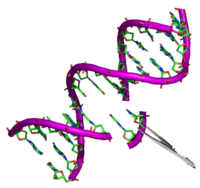
Photo from wikipedia
The use of RNA-based approaches to treat monogenic diseases (i.e., hereditary disorders caused by mutations in single genes) has been developed on different fronts. One approach uses small antisense oligonucleotides… Click to show full abstract
The use of RNA-based approaches to treat monogenic diseases (i.e., hereditary disorders caused by mutations in single genes) has been developed on different fronts. One approach uses small antisense oligonucleotides (ASOs) to modulate RNA processing at various stages; namely, to enhance correct splicing, to stimulate exon skipping (to exclude premature termination codon variants), to avoid undesired messenger RNA (mRNA) transcript degradation via the nonsense-mediated decay (NMD) pathway, or to induce mRNA degradation where they encode toxic proteins (e.g., in dominant diseases). Another approach consists in administering mRNA, which, like gene therapy, is a mutation-agnostic approach with potential application to any recessive monogenic disease. This is simpler than gene therapy because instead of requiring targeting of the nucleus, the mRNA only needs to be delivered to the cytoplasm. Although very promising (as demonstrated by COVID-19 vaccines), these approaches still have potential for optimisation, namely regarding delivery efficiency, adverse drug reactions and toxicity.
Journal Title: Pharmaceutics
Year Published: 2023
Link to full text (if available)
Share on Social Media: Sign Up to like & get
recommendations!